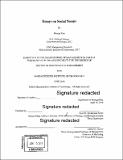Essays on social norms
Author(s)
Kim, Minjae, Ph. D. Massachusetts Institute of Technology
DownloadFull printable version (9.938Mb)
Other Contributors
Sloan School of Management.
Advisor
Ezra W. Zuckerman Sivan.
Terms of use
Metadata
Show full item recordAbstract
The first essay addresses why people might conform to norms that they do not endorse. One explanation is pluralistic ignorance: when everyone appears to endorse a norm, even nonendorsers will conform so as to feign their commitment to the group's values, thereby exacerbating the misperception. But this explanation is limited because people seem to even conform to norms that are widely known to contradict the group's values ("visibly unpopular norms"), to the point that their conformity appears insincere. I argue that such insincere conformity is an especially potent signal of commitment because it shows that one is willing to sacrifice one's personal preferences on others' behalf. Using both qualitative and experimental methods, I study the visibly unpopular norm prescribing excessive drinking in after-hour business gatherings in South Korea. The analysis indicates that an insincere conformist to the drinking norm is perceived as an especially committed relationship partner. An important implication is that some norms might persist not despite the fact they contradict group members' preferences but because of this contradiction. The second essay (coauthored with Ezra W. Zuckerman Sivan) addresses why norms might not persist despite their wide popularity. Recent research suggests that many norms may be upheld by closet deviants who engage in enforcement so as to hide their deviance. But various empirical accounts indicate that audiences are often quite sensitive to this ulterior motive. Our theory and experimental evidence identify when inferences of ulterior motive are drawn and clarify the implications of such inferences. Our main test pivots on two contextual factors: (1) the extent to which individuals might try to strategically feign commitment and (2) the contrast between "mandated" enforcement, where individuals are asked for their opinions of deviance, and "entrepreneurial" enforcement, where enforcement requires initiative to interrupt the flow of social interaction. When the context is one where individuals might have a strategic motive and enforcement requires entrepreneurial initiative, suspicions are aroused because the enforcers could have remained silent and enjoyed plausible deniability that they had witnessed the deviance or recognized its significance. Given that the mandate for enforcement might be rare, a key implication is that norms might frequently be under-enforced.
Description
Thesis: Ph. D., Massachusetts Institute of Technology, Sloan School of Management, 2018. Cataloged from PDF version of thesis. Includes bibliographical references.
Date issued
2018Department
Sloan School of ManagementPublisher
Massachusetts Institute of Technology
Keywords
Sloan School of Management.